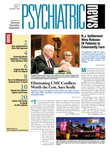Recently I had two referral experiences that I would like to share. The circumstances of both were identical. An insurance company had given two patients my name—however, the company had given out two names: that of a mental health therapist who it said would perform the evaluation and provide treatment and that of “a psychiatrist for your medications.” It does indeed appear that psychiatry has traded off the “50-minute hour” for the “15-minute med-check visit.” Perhaps the time has come to change the official definition of what a psychiatrist does.
I began to wonder about this “sea change”—not just in psychiatry but in medicine in general—and the proverbial swinging pendulum between mind and body. Clearly one cannot have a psychogenic illness without a brain, and as such, the neurosciences and medications are a realistic consideration. However, it does appear that we have taken the psychotherapy out of psychiatry.
I began to wonder how this has come about; it has been a slow and progressive process. Periodically we read about circuit-riding psychiatrists being subsidized liberally by pharmaceutical companies. We read about large pharmaceutical studies. Rarely do we read about psychotherapy studies—an exception being the article in the October 1, 2008, Journal of the American Medical Association, titled “Effectiveness of Long-Term Psychodynamic Psychotherapy: A Meta-Analysis.”
We see pharmaceutical ads saturating the airwaves, magazines, and all manner of reading material. We now have conflict-of-interest disclosures. One must begin to wonder by whom and how is psychiatry being defined. Or perhaps we should remember the Watergate metaphor and “follow the money.” I began to wonder about how our psychiatrists are being trained and what are the philosophies that are defining their training—is it perhaps an amalgam of big pharma, insurance companies, and who knows what else?
Progress is inevitable and realistic. I am not suggesting a return to the past—that also had its limitations, biases, and omissions. But, to repeat myself, we cannot have a psychogenic illness without a brain. We have established the appropriate need to examine the pivotal role of the brain. However, perhaps it is time for psychiatry to reintroduce the 50-minute hour and develop an equal interest in examining the human side of that mind/body equation.
CHESTER BERSCHLING, M.D.
Pittsburgh, Pa.
